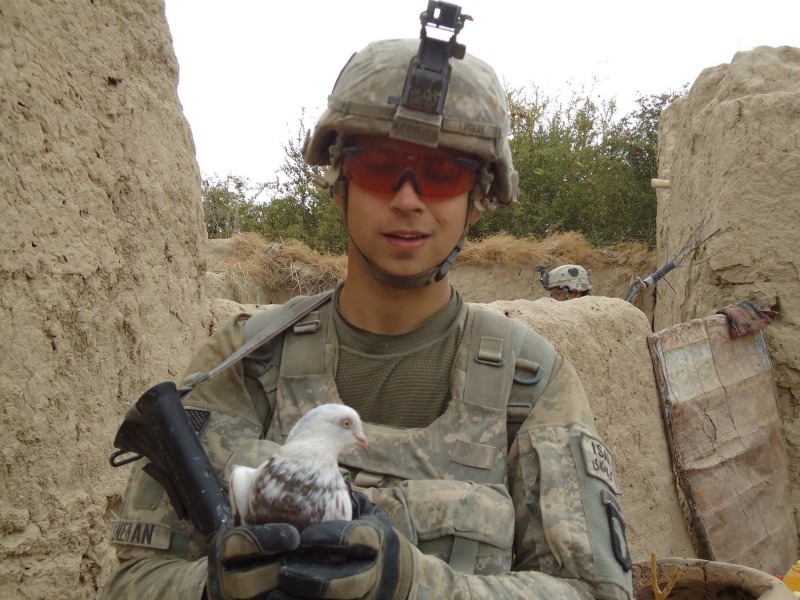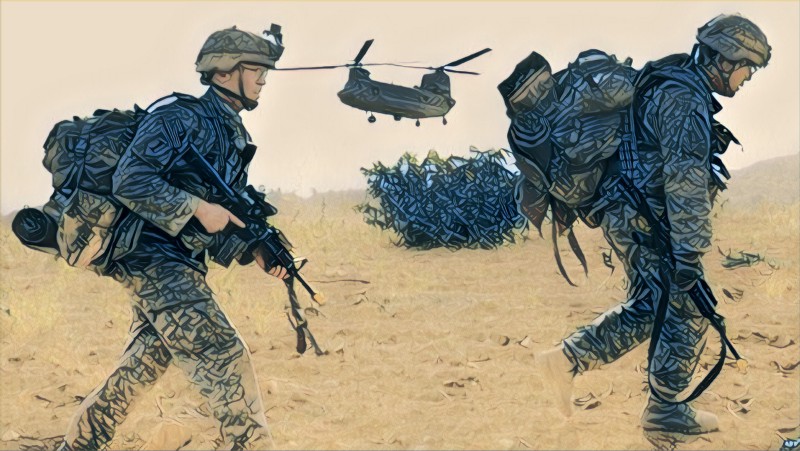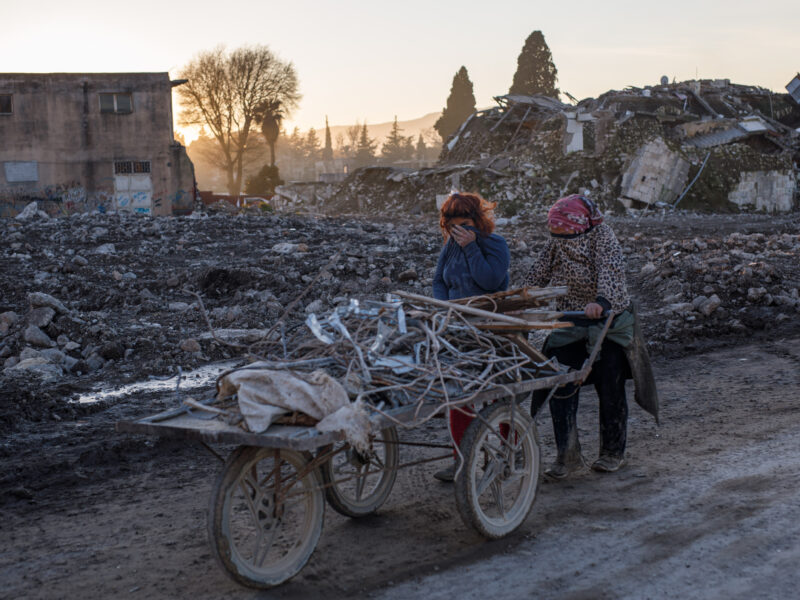This interview was originally published in March 2017.
Adam Linehan was 21 when he joined the Army, an “old guy” at the time he did it. After waking up during basic training and briefly wondering, “What the fuck did I get myself into?” he went on to serve as a combat medic in Iraq and Afghanistan. Today he’s a senior staff writer at Task & Purpose. I spoke to him about Trump, the prospect of more war, and the relationship between military and civilian life for the Anti-Nihilist Institute’s Woke Vets series.
Natalia: You’ve written about the Clint Lorance case— I’ve been following that story for a while, and it freaked me out. Both the case and the reaction to it [Editor’s note: 1st Lt. Clint Lorance was serving in Afghanistan’s Kandahar province when he ordered his men to fire on civilians, resulting in two deaths. The argument of his supporters hinges on the notion that “everyone is a potential enemy in Afghanistan.” Yet not one of Lorance’s men was willing to support his actions in court. Platoon members further testified that Lorance tried to get them to shoot a 12-year-old who came to retrieve the bodies in the aftermath of the shooting.] You can’t understand the Lorance case without understanding the nuances around it, but how do you begin to explain the nuances of war to civilians who have no experience of it?
Adam: If there is one thing that my experience at war taught me it is that war is not that far removed from our everyday reality. It’s a human thing — human beings easily adopt the role of soldier. Civilians overcomplicate it in their minds.
I remember getting back from Afghanistan and a lot of people saying, “Oh, I could’ve never done that.” And my response was always, “You don’t know. You could have probably done it—and it’s not that hard to do.”
There are ways of talking, writing or filming stuff about war that make it accessible. A lot of veterans adopt the stance of, “You’ll never understand this,” but I think that’s a defense mechanism.

Natalia: I’ve spent a lot of time writing about Russia, which has a draft. I think the draft is horrible, but I also notice that in America, because we don’t have a draft anymore, civilians see military life as very removed from their own lives. We end up with a weird dichotomy— people either fetishize the military or say, “Why should I give a fuck about it?” But if you’re American, Iraq and Afghanistan were fought in your name. No matter who you voted for, you can’t get around it — and in my experience, this isn’t something people like to hear. Have you encountered similar denial and/or apathy?
Adam: After I got back from Afghanistan, the Occupy movement took off. People were in the street. And I remember thinking, “Why aren’t people reacting to Afghanistan in a similar fashion?” I had just gotten back from witnessing terrible things and remember being very angry about how few people even cared.
When you’re at war, you think the country’s paying attention. When you get home, one of the first things you realize is that hardly anyone actually gives a shit.
That’s a dangerous mentality. It allows us, as a country, to be in perpetual conflict.
We are ultimately responsible for what our soldiers are doing overseas. I’m a civilian now, but I’m still responsible. But I’ll add that it’s equally dangerous to go from apathy to the fetishization of soldiers.

Natalia: A year ago, I was telling my liberal friends, “Trump’s going to win,” and nobody believed me. Now I’m the one waking up in disbelief every morning, having to tell myself, “Yep, it’s real.” Having said that, I think everything he’s doing is predictable — especially if you have experience with wealthy narcissists. I think someone like that gets off on being in charge of a huge, powerful military. But how would you characterize that relationship? Who do you see him as when you think of him as our commander-in-chief?
Adam: Trump comes from a class of people who don’t serve in the military. On a personal level, he is very far removed from soldiers and their lives. I don’t think he is able to see them for the people that they are.
When he claims to know more about ISIS than the generals, this suggests that he doesn’t hold career officers in high regard. Look at it this way — they took Iraq off the travel ban list. But why was it there in the first place?
If Trump had been interested in the Iraq war and had been following it, he would have known how extremely dangerous it is to insult a country where you have American soldiers on the ground.
American soldiers depend on Iraqi civilians and soldiers for everything from intelligence gathering to basic security. Anyone who has ever been to Iraq would know how dangerous it is to send the message that the travel ban conveyed to the people of that country.
It’s dangerous for a commander-in-chief to think he knows it all, full stop.
In light of that, under this administration, it will take very little for us to get sucked into another war. And when that happens, it’s not going to be managed with the careful consideration that we had under Obama, and even George W. Bush.
I wasn’t a Bush supporter, but when he sent men into combat, he felt it. You can see that he’s still struggling with that decision today. I think Trump is very different.
If we have another Boston Marathon-like bombing, or a San Bernardino-style situation under Trump, he will use that as justification to go to war. He has positioned himself as a strong leader who will destroy terrorism — and even though everyone knows that it’s impossible to win the war on terror like that, he won’t be able to walk it back.
Natalia: How does one win this war?
Adam: I’ve reached the conclusion that counter-insurgency is not an effective strategy.
The key to counter-insurgency is winning the hearts and minds of the local population, and persuading them to get on your side. That’s an impossible task, because you have soldiers in there, and soldiers’ priority is survival.
In a life-or-death situation, a soldier will choose life over the mission.
When you put soldiers in a very dangerous environment and tell them to forge relationships with the locals, soldiers are not opposed to that idea. But the second that bullet start flying, they’re going to shoot back. And the second that one of their buddies is killed, they’re going to perceive that entire population as the enemy. Introduce suicide bombers into the equation, and the suspicion of the local population goes through the roof.
So the distance between the local population and the soldiers grows — and insurgents know that. IEDs and suicide bombers are not designed just to kill, they’re designed to sow suspicion, and they work.
I’m inclined to say that it’s smarter to rely more heavily on special forces and surgical raids. Mass deployment of troops is not the answer in fighting terrorism. Career Delta Force, Navy SEAL guys are very good and take what they do very, very seriously. It’s better to lean more on those guys.
We started these wars. It’s idealistic to think we can sever our involvement completely.
That’s why I’m not advocating not doing anything at all, since we obviously have to keep terrorists on their toes.

Natalia: So you joined the military under Bush, and deployed for the first time under Bush, and then the second time under Obama. And this is a dumb question, but I have to ask it — did you feel any difference while serving under these two administrations?
Adam: No. I was in Iraq when Obama was elected. I thought there would be no more deployments, so when Obama announced the Surge in Afghanistan, I was very surprised.
I don’t remember observing a difference, nobody I knew did either. Obama was very aggressive on Afghanistan. Overall, he didn’t strike me as less aggressive when it came to executing missions at all.
There were complaints that the rules of engagement were getting tighter, but I don’t think that was coming from Obama. I think it was coming from the generals, whose logic was, “We’re under a lot of pressure to turn this war around. We can’t do that while killing civilians.”
By the time Obama came around, there were a lot of military commanders who understood that one of the things holding us back was we were not forging good relationships with the local people and the local government.

Natalia: Let’s say you were ten years younger now. Do you think you would have joined up under a Trump administration?
Adam: To be honest, yes. I was going to be a medic — I wanted to help people. I knew the war would be happening with or without me. And people don’t usually let politics affect their decision to join.
Obviously, a lot of people in the military hated Obama. But they still didn’t have problems with recruiting people.
Natalia: Why did so many people in the military hate Obama?
Adam: A lot of people in the military come from conservative backgrounds. Obama represented the epitome of liberal values to them. He symbolized everything they didn’t stand for.
On a certain level, there was also racism going on. But a lot of the guys in my unit in Iraq? During the campaign, they didn’t know much about Obama. They just knew that he was an eloquent Democrat. That’s all it took for them to think “He’ll take our guns and tighten up the ROEs.”

Natalia: We have a tradition of the military being politically neutral. Do you think this will hold under Trump and his chaotic policies?
Adam: I’m liberal, and I was the only one in my platoon. Most everyone else [in the military] is conservative, and they will be perfectly fine serving under Trump.
Natalia: We’re talking about conservatism, and it’s interesting to me, because Trump is not really conservative. He’s a rich hedonist and a con artist, basically, and will do whatever it takes to keep power. Do you think this will ever become obvious to people?
Adam: I think there are guys in the military who are starting to wake up to some of his shortcomings. So it’s fortunate for Trump that he has [James] Mattis as Secretary of Defense. Mattis is seen as the buffer, as the person who will hold Trump in check on issues that affect the military.
But a lot of people in the infantry are simply happy to have someone like Trump in power, because they want to go to war. They want to have that experience, and Trump is the quickest way to get there.
Keep in mind — a lot of the people in the military aren’t super political. They’re just young guys who like being soldiers.
For what it’s worth, I don’t think that the military could become this super radicalized force that Trump could deploy against the people of the United States.
Natalia: Do you really think Mattis can keep Trump in check?
Adam: Mattis is very strategic. Take the Muslim ban, for example. Mattis knew that this wasn’t smart strategically speaking.
Who was pressuring Trump to remove Iraq from the Muslim ban list? It was Mattis and [National Security Advisor H.R.] McMaster, and Rex Tillerson (surprisingly).
If Trump ever loses Mattis or gets rid of him, there goes a lot of his military support. Because a lot of people in the military are suspicious of the civilians surrounding Trump — people like Steve Bannon or Steve Miller — but I cannot overstate how revered Mattis is by the military. Mattis has put himself in a position where he is indispensable, so if anyone is going to rein in Trump, it’s down to him.



